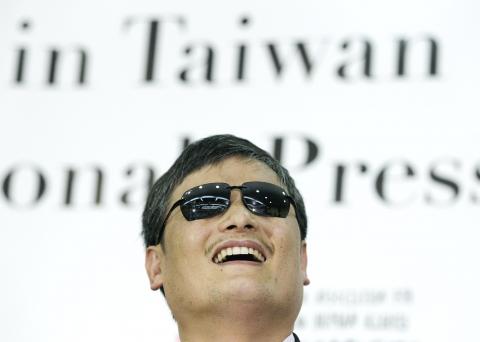Taiwan’s leaders appear to have a lack of understanding of “the essence of Beijing’s authoritarian regime,” despite Taiwan serving as a role model for democratic development in China, Chinese activist Chen Guangcheng (陳光誠) said in Taipei yesterday.
Chen, who has been living in the US after fleeing China in May last year, told an international press conference on the first full day of his 18-day visit to Taiwan, that President Ma Ying-jeou’s (馬英九) refusal to meet him “reflected the fierce competition between a democracy and an authoritarian regime.”
Legislative Speaker Wang Jin-pyng (王金平) also turned down the opportunity to meet the 41-year-old dissident during his visit, which has been dubbed as a “trip for human rights” by its main organizer, the Taiwan Association for China Human Rights.

Photo: Pichi Chuang, Reuters
Visiting Taiwan for the first time, the activist said the success of Taiwan’s democratic development has proven Beijing’s rhetoric that democracy is not suited for the Chinese world to be a lie that “couldn’t be more wrong.”
However, Chen expected Taiwan to stand firm on its democratic system and “engage more with China’s political leaders, but also with its rights activists because they represent the real voice of the people.”
Accompanied by members of his family and his mentor, New York University (NYU) law professor Jerome Cohen, Chen faced the press conference — which attracted more than 100 reporters, and included more than 40 international media outlets — with confidence.
He carefully handled more than 20 questions on various topics, such as his plans after finishing his fellowship at NYU, a suspected attempt to hack into his personal computer by Beijing and his observations on democracy in Taiwan, without undue elaboration.
Chen refrained from criticizing Taiwanese politicians or democratic developments in Taiwan and Hong Kong, which one reporter described as “eroding.”
“If Hong Kong fails to transplant the rule of law to China, Beijing will eventually bring the rule of man to Hong Kong. If Taiwan does not help democratize China, the authoritarian system of government will someday return to intimidate Taiwan,” Chen said.
With regard to his future, Chen said he does not rule out any possibilities, including where he would live, but said he is determined to fight the Chinese Communist Party regime, which imprisoned him between 2006 and 2008, and afterward placed him under house arrest.
Speaking with confidence, Chen said he would “definitely return to China” and that he believed he had done the right thing and “struck Beijing in its Achilles’ heel,” which is what caused it to retaliate so strongly against him.
Chen is scheduled to deliver a speech titled “Human rights as the foundation of cross-strait peace” at the Legislative Yuan and visit Jingmei Human Rights Memorial Park in the outskirts of Taipei today.
He is also scheduled to unveil his new book, titled China, the Book of Living and Dying, at a press conference in Taipei tomorrow.

A Ministry of Foreign Affairs official yesterday said that a delegation that visited China for an APEC meeting did not receive any kind of treatment that downgraded Taiwan’s sovereignty. Department of International Organizations Director-General Jonathan Sun (孫儉元) said that he and a group of ministry officials visited Shenzhen, China, to attend the APEC Informal Senior Officials’ Meeting last month. The trip went “smoothly and safely” for all Taiwanese delegates, as the Chinese side arranged the trip in accordance with long-standing practices, Sun said at the ministry’s weekly briefing. The Taiwanese group did not encounter any political suppression, he said. Sun made the remarks when

The Taiwanese passport ranked 33rd in a global listing of passports by convenience this month, rising three places from last month’s ranking, but matching its position in January last year. The Henley Passport Index, an international ranking of passports by the number of designations its holder can travel to without a visa, showed that the Taiwan passport enables holders to travel to 139 countries and territories without a visa. Singapore’s passport was ranked the most powerful with visa-free access to 192 destinations out of 227, according to the index published on Tuesday by UK-based migration investment consultancy firm Henley and Partners. Japan’s and

BROAD AGREEMENT: The two are nearing a trade deal to reduce Taiwan’s tariff to 15% and a commitment for TSMC to build five more fabs, a ‘New York Times’ report said Taiwan and the US have reached a broad consensus on a trade deal, the Executive Yuan’s Office of Trade Negotiations said yesterday, after a report said that Washington is set to reduce Taiwan’s tariff rate to 15 percent. The New York Times on Monday reported that the two nations are nearing a trade deal to reduce Taiwan’s tariff rate to 15 percent and commit Taiwan Semiconductor Manufacturing Co (TSMC, 台積電) to building at least five more facilities in the US. “The agreement, which has been under negotiation for months, is being legally scrubbed and could be announced this month,” the paper said,

MIXED SOURCING: While Taiwan is expanding domestic production, it also sources munitions overseas, as some, like M855 rounds, are cheaper than locally made ones Taiwan and the US plan to jointly produce 155mm artillery shells, as the munition is in high demand due to the Ukraine-Russia war and should be useful in Taiwan’s self-defense, Armaments Bureau Director-General Lieutenant General Lin Wen-hsiang (林文祥) told lawmakers in Taipei yesterday. Lin was responding to questions about Taiwan’s partnership with allies in producing munitions at a meeting of the legislature’s Foreign Affairs and National Defense Committee. Given the intense demand for 155mm artillery shells in Ukraine’s defense against the Russian invasion, and in light of Taiwan’s own defensive needs, Taipei and Washington plan to jointly produce 155mm shells, said Lin,